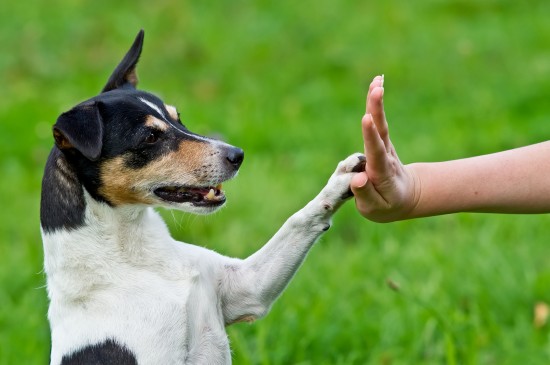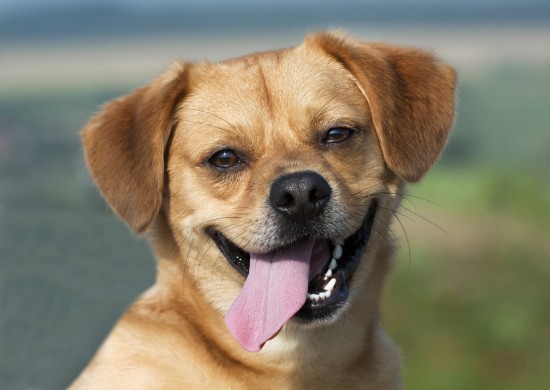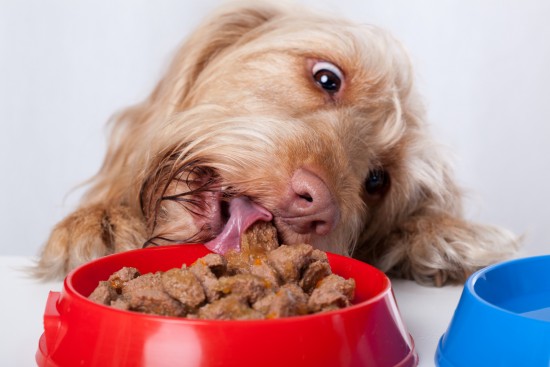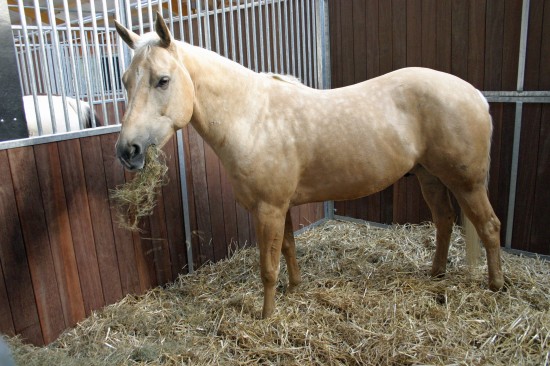
Since the first time one of our pre-historic ancestors tossed a scrap of meat at a wolf, dogs have been living off the leftovers from their master's table. While this is a common practice in many parts of the world, it isn't the best nutrition for the dog. As with humans, dogs also require a well-balanced meal, be that in the form of fresh foods or packaged, store-bought food. Either way, it's a good idea to familiarize yourself with what constitutes a healthy diet for your dog.
Water is probably the most vital yet often overlooked part of a dog's diet. A bowl of clean water should be available to a dog at all times, so that it can drink whenever it gets thirsty. If you've been feeding your dog foods that are unusually salty, keep a close eye on their water bowl, as your pet will want more water (and need to pee afterwards) once they're done with the salty food.
Meat provides many things for the naturally-carnivorous dog (though, ideally, only about half their diet consists of meat), including proteins and fats. Though cooking is good for all meats fed to a dog, only pork and rabbit really need to be cooked. Processed and heavily spiced or salted meats, such as beef jerky, salami, or pork rinds, aren't as easy on a dog's digestive system as they are on a human's digestive system.
Dogs will also gladly eat eggs and fish, though a few words must be said about both first. Fish should be thoroughly deboned, lest a stray fish rib pierce a dog's windpipe, and it should always be cooked. Dogs love eggs, and they don't know the difference between brown eggs and blood spots and ordinary eggs, so you can save some money by buying cheaper eggs.
Grains are another good food for a dog, especially since grains offer all the carbohydrates they might need. Breads, rice, and cereals are all good grains, though all grains should be cooked before you feed them to a dog. However, as important as grains are, they shouldn't be more than half of a dog's diet.
Vegetables are a perfectly fine addition to a dog's diet, though foods like peas and beans should be avoided. Carrots, lettuce, celery, potatoes, and potato skins are fine for a dog to eat. Cooking vegetables is purely optional, though the less time spent cooking the better for your dog, at least in terms of nutrition.
Cheese and dairy products are another good bet, as they provide a healthy amount of proteins and a larger dose of calcium for older dogs. However, not all dogs will appreciate cheese, so know if your dog in particular enjoys it. Dogs can also consume cow's milk in their diet, though newborn pups shouldn't drink cows milk. Further, too much milk in a dog's diet (save for newborn pups), will leave them with a case of diarrhea.
Dogs can become fat and out of shape or undernourished just like their owners. When deciding how much food to give your dog, the general formula is an ounce of food for every pound of the dog's weight. Another factor to take into consideration would be how active your dog is. If he's working herding cattle or sheep all day, as opposed to lounging around a penthouse apartment with not much to do, you will have to adjust the amounts of food appropriately.
 Canine Communication - Three Ways In Which You Might Be Doing Your Dog A Disservice
Canine Communicat
Canine Communication - Three Ways In Which You Might Be Doing Your Dog A Disservice
Canine Communicat
 The All-important Temperament In Dogs
The All-important
The All-important Temperament In Dogs
The All-important
 10 Tips For Feeding Bitches During Pregnancy & Lactation
10 Tips For Feedi
10 Tips For Feeding Bitches During Pregnancy & Lactation
10 Tips For Feedi
 How To Minimise The Chances Of Your Dog Developing Bloat
How To Minimise T
How To Minimise The Chances Of Your Dog Developing Bloat
How To Minimise T
 What Is Equine Herpes?
What Is Equine He
What Is Equine Herpes?
What Is Equine He
Copyright © 2005-2016 Pet Information All Rights Reserved
Contact us: www162date@outlook.com